Soft water lets you use 50% less soap while getting better results. Start with half your usual amount and adjust as needed. Choose pure, dye-free soaps with neutral pH to avoid the slippery feeling. You'll get more lather, fewer soap scum issues, and cleaner dishes and laundry without fabric softeners. Your skin will thank you as harsh minerals no longer cause dryness or irritation. Discover how these simple adjustments transform your daily cleaning routine.
7 Essential Soft Water Tips For Better Soap
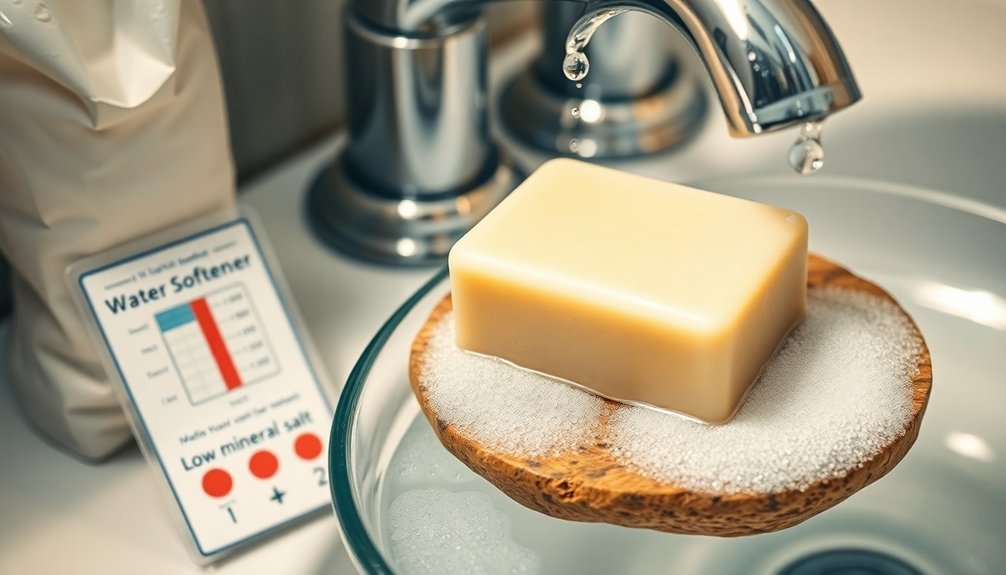
When you've invested in a water softening system, maximizing its benefits requires adjusting your cleaning habits. With soft water, you'll want to switch to pure soaps without fillers, dyes, or perfumes. These cleaner formulations work more effectively with your water softener, preventing soap scum while delivering superior cleaning power.
You can reduce soap usage by up to 50% in laundry and dishwashing—a significant cost-saving advantage. Start by using half your normal amount, then experiment until you find the perfect balance. Using too much soap creates slippery surfaces and rinsing difficulties.
Ditch fabric softeners completely; they're unnecessary with soft water, which naturally leaves fabrics softer and colors brighter.
This simplified approach not only improves cleaning results but also benefits your skin by eliminating harsh minerals that cause dryness and irritation.
Understanding Water Hardness and Its Impact on Soap Performance
Although invisible to the naked eye, the minerals in your water dramatically influence how effectively your soap works.
Water hardness, measured in Grains per Gallon (GPG), directly affects soap performance in your daily routine.
In hard water, calcium and magnesium minerals bind with your soap, creating that frustrating soap scum that diminishes cleaning power.
You'll notice your soap doesn't lather well, breaks up quickly, and you're using 2-3 times more product than necessary.
Soft water (less than 1 GPG) transforms this experience completely.
Your soap lathers abundantly with less product, maintains stability longer, and delivers superior cleaning results.
The absence of hardness minerals means no more fighting hard water problems like soap scum and ineffective washing.
You'll enjoy better cleanliness while using considerably less soap.
Why Soft Water Creates Superior Lather With Less Product
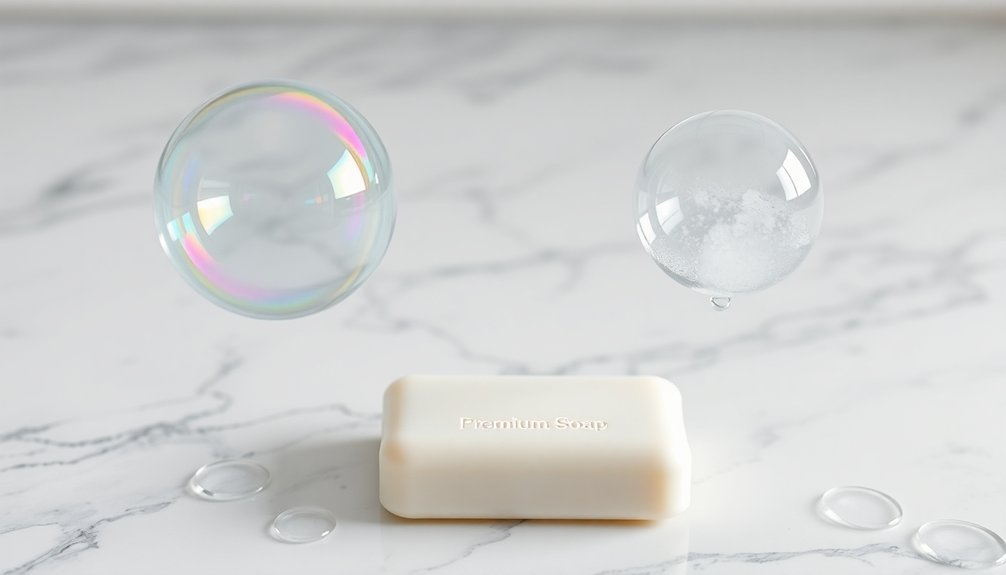
Because soft water lacks the mineral interlopers that sabotage your soap's performance, you'll immediately notice a dramatic difference in lathering quality.
Without calcium and magnesium ions to interfere, your soap can do its job properly, creating luxurious, long-lasting lather while using considerably less product.
A water softening system isn't just a luxury—it's an investment that transforms your daily routines.
You'll use only 1/3 to 1/2 of your normal soap amount while achieving better results.
- Feel the silky, creamy lather glide across your skin, leaving it truly clean
- Watch in amazement as rich bubbles form instantly with minimal effort
- Experience the satisfaction of seeing your favorite soap perform as intended
- Save money as your soap, shampoo, and detergents last months longer
Selecting the Right Soap Formulations for Softened Water
When selecting soaps for softened water, you'll achieve better results with pure, dye-free and perfume-free formulations rather than detergent-fortified commercial products.
You can cut your soap usage by half without sacrificing cleaning power, creating immediate cost savings while maintaining effectiveness.
Choosing lower pH soaps, like Dove, will help minimize the slippery feeling sometimes experienced with sodium-softened water, making your bathing experience more comfortable.
Pure Over Commercial
Since you've invested in a water softener system, selecting the right soap formulation becomes essential to maximize its benefits. Pure soap options greatly outperform commercial soaps in softened water environments. Without fillers, dyes, and perfumes, they deliver superior cleaning effectiveness while requiring only 1/3 to 1/2 the amount you'd normally use.
- You'll feel the immediate difference as pure soaps rinse away completely, leaving your skin soft instead of coated with chemical residue.
- You'll save money as your soap lasts 2-3 times longer in softened water.
- Your family's skin health will improve without exposure to unnecessary harsh additives.
- You'll contribute to environmental protection through reduced chemical runoff and packaging waste.
Consider exploring online soap crafters or DIY recipes to find the perfect pure soap for your softened water system.
Minimize Soap Usage
One of the most powerful advantages of softened water extends beyond your soap selection—it dramatically changes how much you need.
With soft water, you'll use just 1/3 to 1/2 the normal amount of soap while achieving the same or better cleaning results.
Pure soaps without dyes and fragrances work exceptionally well in softened water. You don't need detergent-fortified products since the natural cleaning properties of simple soaps are fully activated in soft water conditions.
Start by using less soap than you're accustomed to and adjust as needed. This approach not only saves you money over time but also reduces chemical runoff in wastewater.
Experiment with progressively smaller amounts until you find the ideal balance between effective cleaning and minimal product use.
Consider Ph Balance
The pH level of soap products plays an essential role in how they interact with your softened water system. When you're using sodium ion exchange softening, high-pH soaps (9.0-10.0) often create that frustrating slimy feeling on your skin.
Instead, opt for neutral pH soaps like Dove (pH 7.0) or potassium-based formulations that work harmoniously with soft water chemistry.
- Feel the immediate relief of switching to lower pH soaps that eliminate that clingy, uncomfortable residue!
- Transform your shower experience with pure soaps free from harsh dyes and fragrances!
- Protect your skin's natural balance while still enjoying your water softening benefits!
- Reclaim control over your water quality without compromising on cleanliness!
Testing your water's pH and alkalinity can guide you toward soap choices that enhance rather than detract from soft water's advantages.
Adjusting Your Soap Usage: Less Is More With Soft Water
With soft water, you'll need to measure considerably smaller amounts of soap—try starting with half your usual quantity and adjust based on cleaning results.
Watch for excessive suds forming during washing, as this signals you're using more soap than necessary in your softened water system.
Concentrated cleaning products work exceptionally well with soft water, allowing you to use even less while achieving superior cleaning power.
Measuring The Right Amount
Because soft water interacts differently with cleaning products, you'll need to considerably adjust your soap usage downward. Start by using just one-third to one-half of your normal amount when cleaning with soft water.
You'll be surprised to discover this smaller quantity produces more lather and cleans more effectively than larger amounts in hard water.
- Feel the satisfaction of watching your soap products last twice as long while saving money on household essentials
- Experience the luxury of softer, less irritated skin without the residue that excess soap can leave behind
- Enjoy the freedom from that frustrating slippery feeling that comes from using too much soap
- Take pride in making an environmentally conscious choice by reducing chemical runoff
Watch For Excess Suds
When shifting to soft water, you'll quickly notice how even small amounts of soap create abundant lather.
This newfound efficiency means you'll need just 1/3 to 1/2 of your usual soap amount to achieve the same cleaning power.
Pay attention to excess suds during washing—they're a clear signal you're using too much product.
Overusing soap with your water softener can leave a slippery feel on skin and surfaces or leave white residue after drying.
You'll also waste time with unnecessary rinsing.
If you're constantly battling excess suds, gradually reduce your soap usage until you find the perfect balance.
Consider switching to pure soaps without fillers for even better results.
Your adjustment period may take a few weeks, but the savings and improved cleaning results are worth it.
Concentrated Products Work Better
Concentrated soaps and detergents truly shine in soft water systems, delivering superior cleaning power with minimal product. When you've installed a water softener, you're removing hardness minerals that typically fight against your cleaning products.
Without these minerals present, you'll find that concentrated soap products work remarkably efficiently—often requiring just one-third to one-half of your normal amount.
- Feel the satisfaction of watching a little soap go an incredibly long way
- Enjoy the financial freedom of spending less on cleaning supplies each month
- Take pride in reducing your environmental footprint with less chemical runoff
- Experience the luxury of residue-free dishes and clothing without excess product
Water softening agents create the perfect environment for concentrated formulas to work their magic without interference, saving you money while delivering superior cleaning results.
Preventing the "Slippery Feel" When Bathing With Soft Water
Although many homeowners invest in water softeners for their numerous benefits, the slippery sensation experienced during bathing can be an unwelcome surprise. This slimy feel occurs when sodium ions in soft water interact with high pH soaps, creating that distinctive slick texture on your skin.
You can combat this sensation by switching to soaps with a neutral pH, such as Dove. These products work better with soft water and won't contribute to the sliminess.
Additionally, reduce soap usage by 50% when bathing—soft water creates more suds with less product, making rinsing easier.
For persistent issues, test your water's pH level and consider potassium-based soaps instead of sodium-based ones.
Installing additional filtration systems or dealkalizers can also effectively eliminate the slippery feel, though at higher cost.
Optimizing Laundry and Dishwashing With Soft Water Soap Combinations
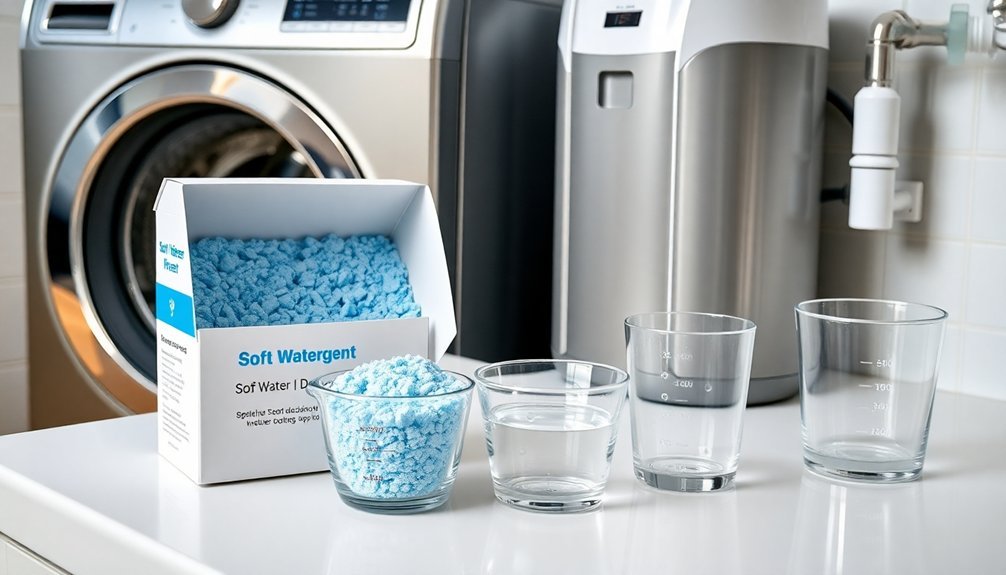
Soft water transforms your laundry and dishwashing routines by greatly reducing the amount of detergent you'll need while improving cleaning results.
With soft water, you'll cut detergent usage by up to 50% and still achieve cleaner clothes and spot-free dishes. Pure soaps work best, as they don't contain the fillers needed to combat hard water minerals.
- Experience the joy of pulling out perfectly white towels that feel soft instead of stiff
- Save money on expensive detergents and rinsing agents while getting better results
- Feel proud showing off spotless glassware that sparkles without water marks
- Protect your favorite clothes with gentler stain removal at lower temperatures
You'll notice the difference immediately—brighter colors, softer fabrics, and cleaner dishes with considerably less product and effort.
Frequently Asked Questions
Does Soap Work Better in Soft Water?
Yes, soap works better in soft water. You'll use less soap, get more lather, and experience better cleaning results. Your skin will feel softer too, as there's no mineral residue forming soap scum.
How Do You Make Soft Water Taste Better?
You can make soft water taste better by adding lemon slices, infusing herbs like mint, using an activated carbon filter, mixing in fruit juice, or simply chilling it in the refrigerator to improve palatability.
Does Soft Water Give Good With Soap?
Yes, soft water works excellently with soap. You'll need less soap to create rich lather, experience no soap scum, and enjoy cleaner skin and hair after washing. It's more effective for all cleaning purposes.
Do You Need More Detergent if the Water Is Soft?
No, you'll actually need less detergent with soft water. You can reduce your detergent usage by about 50% because soft water allows soap to lather and clean more effectively without mineral interference.
In Summary
You've now learned how soft water transforms your soap experience. By understanding water hardness, choosing appropriate products, and adjusting your usage, you'll enjoy better lather while using less soap. Don't worry about that slippery sensation—it's actually a sign your water is working properly. Apply these tips to your bathing, laundry, and dishwashing routines for cleaner results and significant savings over time.
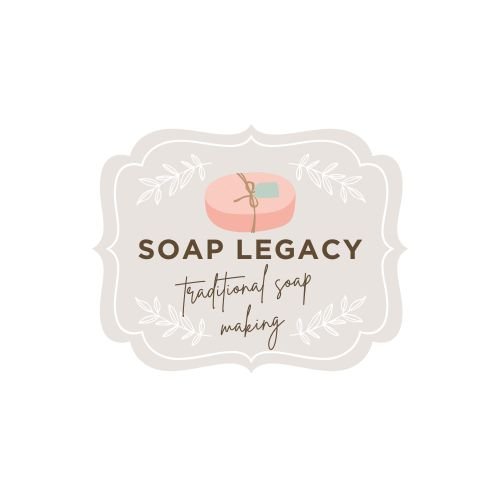
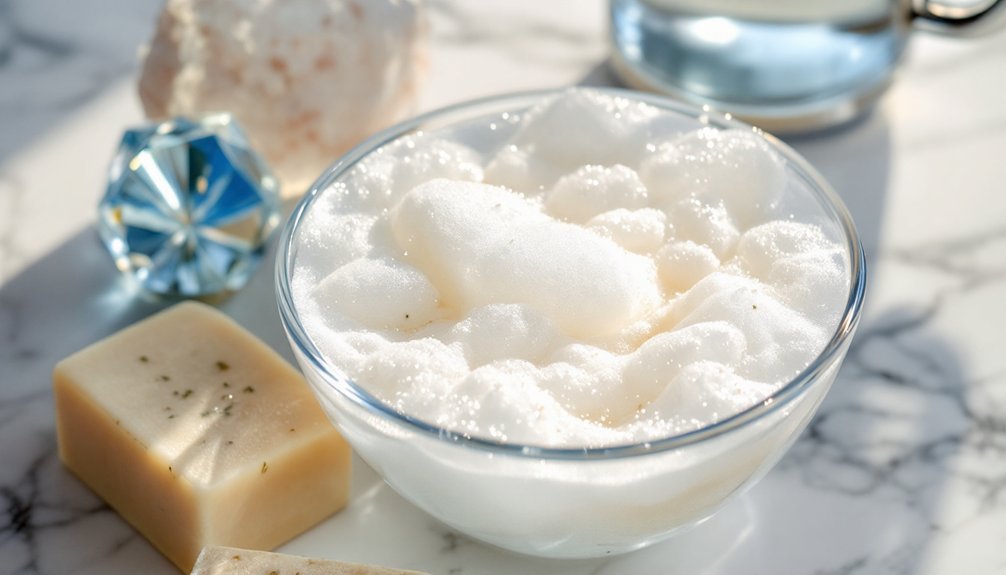
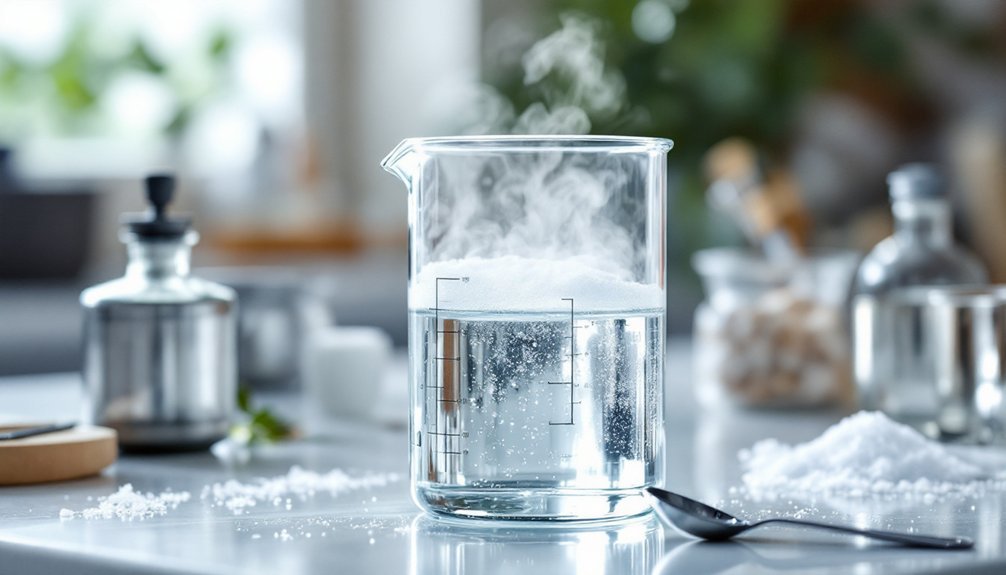
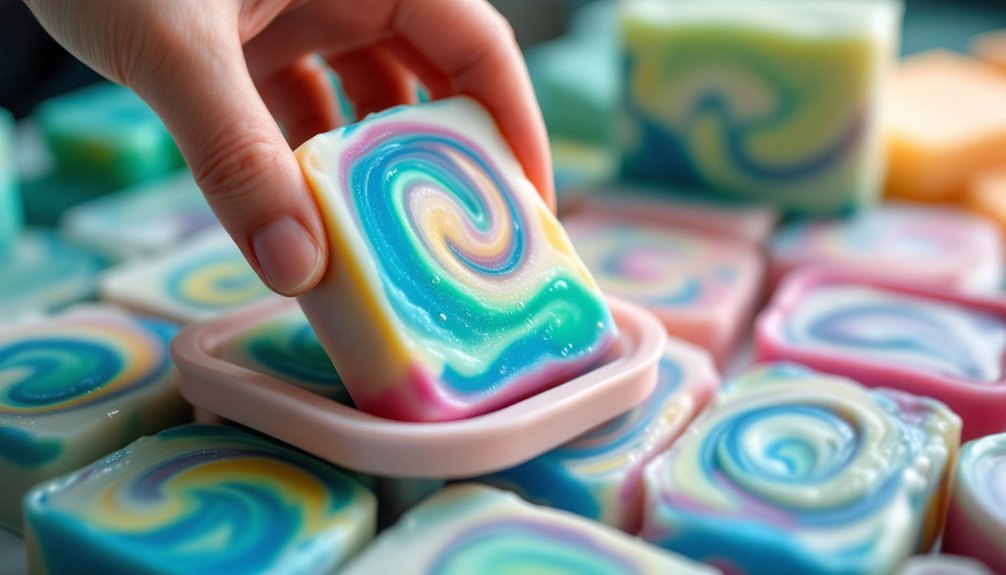

Leave a Reply